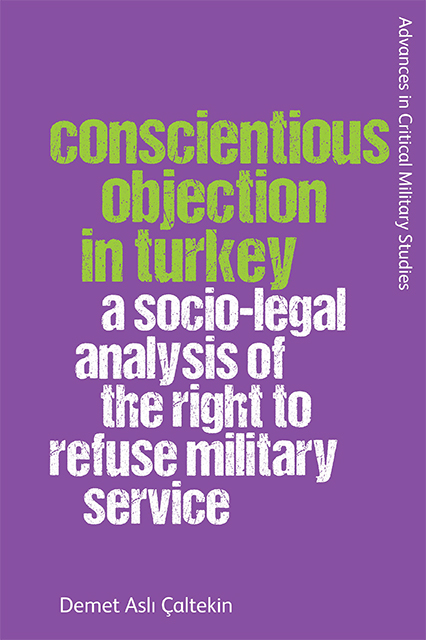Book contents
- Frontmatter
- List of Contents
- Acknowledgements
- List of Legislation
- List of Cases
- List of International Documents
- Setting the Scene: Militarisation of Society
- 1 Conscription and Turkey's Changing Socio-political Structures
- 2 Conscientious Objection and International Law
- 3 The Compatibility of Turkish Domestic Law with International Law
- 4 A Typology of Conscientious Objection in Turkey
- 5 Conscientious Objection as an Act of Civil Disobedience
- 6 Curious Women Conscientious Objectors to Military Service in the Male Conscription System in Turkey
- Conclusion: Demilitarisation of Society
- Bibliography
- Index
1 - Conscription and Turkey's Changing Socio-political Structures
Published online by Cambridge University Press: 14 July 2023
- Frontmatter
- List of Contents
- Acknowledgements
- List of Legislation
- List of Cases
- List of International Documents
- Setting the Scene: Militarisation of Society
- 1 Conscription and Turkey's Changing Socio-political Structures
- 2 Conscientious Objection and International Law
- 3 The Compatibility of Turkish Domestic Law with International Law
- 4 A Typology of Conscientious Objection in Turkey
- 5 Conscientious Objection as an Act of Civil Disobedience
- 6 Curious Women Conscientious Objectors to Military Service in the Male Conscription System in Turkey
- Conclusion: Demilitarisation of Society
- Bibliography
- Index
Summary
Introduction
The sources of present beliefs are past experiences and practices […] Prior institutions, prior strategies, prior actions delimit current opinions, and stories of yesteryear reveal what bargains have been broken and which kept […] History also shapes institutions and regimes, and history can reveal the underlying causes for institutional change or stability.
(Levi 1997: 3)Significant historical events that change societies do not happen in a vacuum. They involve lengthy processes of convincing people to embrace the new conditions. The introduction of the conscription system is undoubtedly one of those processes that required a long persuasion phase. Hence, historical facts behind the emergence of the conscription system and the gradual integration of military values into society reveal the core beliefs influencing the conscription system in general and unveil the tools used by states to gain society's consent. History does indeed mirror states’ policies regarding the conscription system and offers valuable insights into the perspectives and motivations of those opposing conscription.
Historically, conscription during war was seen as the most efficient system to boost manpower, strengthen national identity and enforce the notion of the good citizen (Burk 1992: 50). The ‘victory’ of the armies further provides justification for having a conscription system and mass armies. Turkey was not immune to this perception of ‘victory’. The traumatic effects of two big wars, World War I and the War of Independence, had an immense effect on shaping the conscription system in Turkey and society's perception of compulsory military service. When the War of Independence brought about victory, the TAF gained social support and were hailed as the ‘hero’ (Celenk 2009: 123). Since the creation of the new Republic, the Armed Forces have continued to play a significant role in the political arena because they contributed to the Republicbuilding process and the westernising of society. This turned the army into a ‘political symbol of nationhood’ and a tool used to maintain national security (Sakallioğlu 1997, 154). Even after the establishment of the Republic, the top figures involved in politics continued to have a military background, and Mustafa Kemal Ataturk, founder of the Republic, enjoyed the military's support for the reforms and principles that he introduced (Tachau and Heper 1983: 19–20).
- Type
- Chapter
- Information
- Conscientious Objection in TurkeyA Socio-legal Analysis of the Right to Refuse Military Service, pp. 13 - 30Publisher: Edinburgh University PressPrint publication year: 2022



